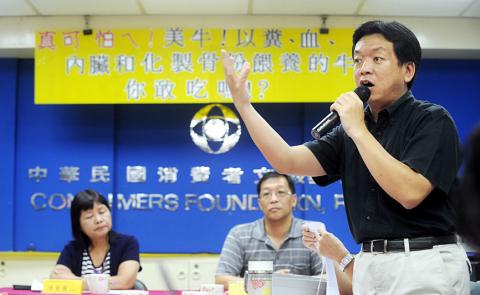A Taiwanese inspection delegation concluded yesterday that beef products imported from the US to Taiwan are safe to eat, after wrapping up a visit to check beef safety in the US, where a new case of bovine spongiform encephalopathy (BSE, commonly called mad cow disease) was confirmed late last month.
The conclusion came after the seven-member delegation visited nine slaughterhouses, cattle farms, feed producers and laboratories across the US, Council of Agriculture counselor Watson Sung (宋華聰), who headed the group, told a news conference upon its return to Taiwan.
The slaughterhouses visited are responsible for supplying 65 percent of the US beef that is exported to Taiwan, the council said.

Photo: Lin Cheng-kun, Taipei Times
The 23-day trip to gain was aimed at garnering a deeper understanding of US control and quarantine procedures with regards to mad cow disease and Sung said he found the measures taken there to be “very rigorous and efficient.”
However, the delegation found an oversight at a Kansas-based slaughterhouse in its operational procedure for removing cattle tonsils, Sung said, adding that the US authorities took immediate measures to deal with the issue.
Beef produced at that slaughterhouses has been barred from entry to Taiwan, Sung said.
About 10 percent of US beef imports to Taiwan were from that one slaughterhouse.
Although Taiwan does not import cow tonsils from the US, the oversight was against the slaughterhouse’s standard operating procedures that require the removal of potentially risky materials and needed to be improved, the council said.
The delegation also met with officials from the US Department of Agriculture and representatives from the US Consumers Union, Sung said.
Council of Agriculture Minister Chen Bao-ji (陳保基), who was also at the press conference, said a detailed report on the findings of the inspection trip would be released early next month.
On April 24, a dairy cow at a farm in California was confirmed to be infected with mad cow disease by the Department of Agriculture. It was the fourth case of BSE in the US since 2003.
BSE is fatal to cows, while eating tainted meat can cause a fatal brain disease in humans known as variant Creutzfeldt-Jakob disease.
Taiwan routinely sends a delegation to inspect US slaughterhouses each year. This year’s schedule was brought forward as a result of the case of mad cow disease.
Taiwan first banned imports of US beef when a case of mad cow disease was reported in Washington State in December 2003 and then reopened its doors to imports of boneless US beef from cattle under 30 months old in April 2005.
Another ban was imposed in June 2005 when a second US case was reported.
Imports of boneless beef from cattle under 30 months of age were resumed in 2006 and imports of bone-in beef were resumed in late 2009, but Washington has been pressing for wider opening and more recently lobbied for Taiwan to lift its ban on beef containing residue of the leanness-enhancing drug ractopamine.
After the government decided to conditionally lift the ban in early March, the legislature is now reviewing draft amendments to a food safety act related to the beef issue and is expected to vote on three draft amendments to the Act Governing Food Sanitation (食品衛生管理法) before the current session ends in the middle of next month.
Asked whether Taiwan would send another inspection delegation to the US over the ractopamine issue, Chen said a decision would only be made after the legislature made a final decision on amendments to the food act.

Alain Robert, known as the "French Spider-Man," praised Alex Honnold as exceptionally well-prepared after the US climber completed a free solo ascent of Taipei 101 yesterday. Robert said Honnold's ascent of the 508m-tall skyscraper in just more than one-and-a-half hours without using safety ropes or equipment was a remarkable achievement. "This is my life," he said in an interview conducted in French, adding that he liked the feeling of being "on the edge of danger." The 63-year-old Frenchman climbed Taipei 101 using ropes in December 2004, taking about four hours to reach the top. On a one-to-10 scale of difficulty, Robert said Taipei 101

Nipah virus infection is to be officially listed as a category 5 notifiable infectious disease in Taiwan in March, while clinical treatment guidelines are being formulated, the Centers for Disease Control (CDC) said yesterday. With Nipah infections being reported in other countries and considering its relatively high fatality rate, the centers on Jan. 16 announced that it would be listed as a notifiable infectious disease to bolster the nation’s systematic early warning system and increase public awareness, the CDC said. Bangladesh reported four fatal cases last year in separate districts, with three linked to raw date palm sap consumption, CDC Epidemic Intelligence

Two Taiwanese prosecutors were questioned by Chinese security personnel at their hotel during a trip to China’s Henan Province this month, the Mainland Affairs Council (MAC) said yesterday. The officers had personal information on the prosecutors, including “when they were assigned to their posts, their work locations and job titles,” MAC Deputy Minister and spokesman Liang Wen-chieh (梁文傑) said. On top of asking about their agencies and positions, the officers also questioned the prosecutors about the Cross-Strait Joint Crime-Fighting and Judicial Mutual Assistance Agreement, a pact that serves as the framework for Taiwan-China cooperation on combating crime and providing judicial assistance, Liang

US climber Alex Honnold left Taiwan this morning a day after completing a free-solo ascent of Taipei 101, a feat that drew cheers from onlookers and gained widespread international attention. Honnold yesterday scaled the 101-story skyscraper without a rope or safety harness. The climb — the highest urban free-solo ascent ever attempted — took just more than 90 minutes and was streamed live on Netflix. It was covered by major international news outlets including CNN, the New York Times, the Guardian and the Wall Street Journal. As Honnold prepared to leave Taiwan today, he attracted a crowd when he and his wife, Sanni,